“Hey, dad, can you tell me how you and mom met again? What made you fall in love with her? If I were to make you dinner, what would you want? Who was your favourite actor? Is there somewhere in the world you would travel to if you could? What did you think the first time you laid eyes on me? Are you proud of me, even though I’ve made mistakes? What’s the meaning of life? Where did you go when you died? Can you please send me a sign you are okay?”
The other day I said to my son, “Sometimes I think of all the questions I would ask my dad if he were still alive.” My son said, “Sounds like a great idea for a blog post, mom.”
He is the same son who suggested I write a book. So I did. Four times.
Meanwhile, as the seasons change, I get pulled into the melancholy that goes with winter’s onset—rain-drenched nights, crisp star-studded blackness, and a silver-clawed moon casting shadows on leafless trees. The obvious reminders indicate summer is over. Yet, I wonder if I am ready.
“Starry, starry night
Paint your palette blue and gray
Look out on a summers day
With eyes that know the darkness in my soul.”
The song “Vincent” by singer-songwriter Don Mclean reminds me of my dad. He was also named Vincent.
“Starry, starry night
Flaming flowers that brightly blaze
Swirling clouds in violet haze
Reflect in Vincent’s eyes of china-blue
Colors changing hue
Morning fields of amber grain
Weathered faces lined in pain
Are soothed beneath the artist’s loving hand”
His lyrics simultaneously warm and haunt me and cause my tears to catch and hover, not falling, but tucked away inside like the many unanswered, plaguing questions I have for my father.
Am I mourning the changing seasons, or the loss of my father? Both seem to intermingle with the other.
With continued thoughts of my dad, my mouth’s downward pout moves ever so slightly into a smile. The ache in my heart is replaced with relief in my soul because I remember my father was my salvation.
That’s what my memories sometimes do, they trigger the sad times from my past or happy thoughts of days gone by. Two emotions in sync with the other, harmonious and side by side.
I can trust my brain, but my feelings not so much. I have to remind myself that feelings are not always factual. This has helped me to figure out that sometimes my emotions are not telling me the truth; they are lies, I tell myself. For example, I concluded long ago that just because someone looks at me a certain way does not mean they are mad or judging me. A solution for me is to get an outside perspective from someone I trust. This little trick is far less painful than feeling like my world is crashing in on me.
The mind is like a capable, fine-tuned machine. I keep mine in good working order. However, sometimes it needs a tune-up, especially when visuals, smells, songs and memories encourage recollections and bring up intense feelings and emotions.
Therapists and counsellors have taught me that even though the brain automatically stores experiences into a form of memory, there are times when the brain “walls off” memory as a coping mechanism. For example, amid trauma, the brain may wander off and work to avoid the memory. Sometimes I have a mild dissociation that causes me to daydream or get lost in my thoughts. However, there have been times in my life when I have experienced a severe and more chronic case of trauma that I cannot easily overcome, and therefore dissociation helps me. But only for a time, because if not unravelled and sorted through, it grumbles if poked. It’s hard to move forward when the past is griping, fussing, and tormenting.
Instead of pushing everything down, my writing has helped bring everything to the surface.
I always thought the term “getting over it” was a harsh thing to say, as in, stop feeling unhappy about something or stop being controlled or bothered by something. But then I learned the origin of the phrase “get over it” was used as a late 14th century meaning for “recover.” I was fascinated when I researched synonyms for “getting over it,” and words such as conquer, defeat, overthrow, and reduce came up.
So, my investigation made me think again.
Then I looked up the dreaded word “trauma,” which included words such as agony, damage, and ordeal. The worst part is that trauma often threatens what we value most. Still, if we can overcome it, we experience a positive outcome of personal growth, more robust relationships, and a deeper appreciation for life. Trauma can permanently change us. We become different because of it. If we dig deep, face our fears, and overcome them, we find new strength.
So maybe the phrase “getting over it” is a good thing. Likewise, changing and becoming different is not a bad thing.
As Emily Dickinson once said, “the mind is more open than the sky,” which I have learned to be true regarding the complexity of storing memories.
And what about this…
Over time, do we forget something deliberately, or does it become more challenging to remember?
I was twenty-six years old when my dad was diagnosed with an inoperable brain tumour. My sister-in-law and I noticed his dizzy spells and memory lapses. His usual flow in storytelling became interrupted by patches of silence, causing his furrowed brow and the confused look in his eyes to concern us.
The day I was given the announcement for the beginning of his end, was one of those crisp October days with crackling leaves underfoot, brisk air all around, and a warm sun coaxing its vitamin D into my bones. The kind of day with the healing splendour of daylight.

Of course in my mind, my usual, and sometimes annoying positive outlook encouraged me to believe the tarantula-like mass in my father’s brain would and could be removed. But the professionals said no, because the tumour had octopus-like arms reaching their tentacles in and around his brain’s essential parts. Evil. Encircling. Choking.
It was a horrible thought and an even worse reality.
Like a rude, obnoxious, know-it-all, I snubbed it. I looked down my nose at it and refused to accept such a ridiculous prediction. I would not welcome my father’s death sentence in any way, shape, or form.
“Oh really, hmmm, that’s nothing! My dad has survived extreme poverty, abandonment as a child, and so much heartache, while keeping up a happy disposition and gregarious laugh. He will surely beat this.” I said this out loud to whomever would listen.
Denial can be a wonderful thing, and yet debilitating, all in one fell swoop.
The treatments stole his hair, as the disease took away his voice, and his usually handsome, chiselled good looks became puffy and foreign. Simultaneously, I refused to believe he would soon leave me.
I can still hear myself saying, “My dad has survived far worse…a two-hundred-foot fall down the side of the Capilano Suspension bridge; a near-fatal heart attack while driving on the Upper Levels Highway; being burned in a fire in Mission with skin grafting that would make others cry out in horrific agony. He will beat a measly ole brain tumour, I’m sure of it!”
After I lamented, my father confidently and knowingly smiled at me as if he knew he would beat it too. Although, in retrospect, maybe he was smiling at my blind love for him.
As the youngest in my family, I did not think or have any clue that I should go to an appointment with my father, or do any research, or even ask any questions. Everyone else had always taken care of me. He was 70, my mom was 65. It was as if, even at 26 years old, I still thought of myself as being under the care of my parents.
During this time of trauma and terror in my personal life, I worked for a company called TLC—Tender Loving Care. They provided services for older adults in need of a friend or a helping hand. My favourite client was a 92-year-old retired teacher living in a mansion by herself in Shaughnessy. Her sister had passed away in one of the upstairs bedrooms. The whole setup had an eerie sensation and mysterious essence of the 1980s show Murder She Wrote with Angela Lansbury. There was a lightness to the woman, but something dark lurking in the atmosphere. I was always a little bit frightened to be there, but my client’s sweetness candy-coated the experience.
My duties included making her breakfast, doing her laundry, making her dinner for later, and visiting.
She was in the habit of barricading her door when she was alone, so each time I went, we had to go through the process of her identifying that I was a friend and not a foe, before she would let me in. There she was, no taller than five feet, a sweet waif of a woman, withered and worn and smiling ear to ear, so happy to be having a caller.
Once inside, she began telling me stories of her past. She spoke of her father building their home in the 1920s, and how she had met Ronald Regan when he visited Vancouver. Her recollections described the southwest area of Vancouver as expansive farmland, horses grazing, wheelbarrow rides, and the clanging of the street car on South Granville street. Dances and dance cards, and the man she loved marrying someone else. Broken hearts and a sister she adored. After she told me they were both spinsters, a faraway look glazed her eyes, and she paused. I did not know if she stopped talking because she forgot what she was about to say, or if the memories were too painful to recall.
I hung on to her words and visualized her fascinating life.
When they placed my dad in the palliative care ward of Lions Gate Hospital, I worried and became thrilled when a nurse told me he had eaten a small portion of jello. I remember being pleased and hopeful that he would still make it—denial, contradiction, and avoidance.
“Starry, starry night
Paint your palette blue and gray
Look out on a summer’s day
With eyes that know the darkness in my soul.
Shadow on the hills
Sketch the trees and daffodils
Catch the breeze and the winter chills
In colours on the snowy linen land.”
While at his bedside on September 25, 1987, when he could no longer see, and was just a shell of the man he once was, I told him it was okay for him to go. I reassured him I would be okay.
With such strength, he gripped my hand, which felt like a feather soft in his, and he held on tightly. I could have stayed like that for a long time. I did not want to let go or tell him he could let go, but I did. I needed to free him from his pain.
“Now I understand
What you tried to say to me
How you suffered for your sanity
How you tried to set them free
They would not listen, they did not know how
Perhaps they’ll listen now.”
In retrospect, I now know his vice-like grip when his life was almost finished was his way of saying “I love you, thank you, I am sorry, but I have to go now…” He was comforting me and reassuring me he was going to be okay.
The question was and still is, but will I be okay?
As sad as this may sound, I still think of him thirty-four years later. But my thoughts have shifted, and leaned more towards happy memories. My dad was playful, fun, and funny. We had a game that was symbolic and so telling—wrapping his hands around my little toddler waistline, he would throw me up in the air, at least ten feet, and catch me without fear that I would be dropped. Bystanders watched my dad’s strength in hoisting me up and out of his arms. I loved the gasps and how people covered their mouths in alarm towards my father’s antics. To this day, I can still feel the freeness of looking down at him in the air, my bird’s eye view seeing his arms outstretched, waiting to catch me, and landing in his strong arms, safe and sound on impact, and into his tight embrace.

And then one day, when I asked him, “Please, Daddy, throw me up in the air!” He responded, “Oh, you are a big girl now, and I’m afraid I can no longer manage to get you up that high, let alone catch you safely when you land.”
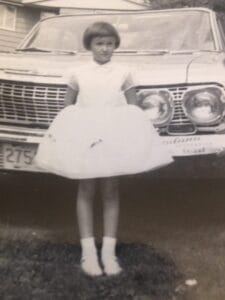
Instead of feeling sad that our game had ended, I felt terrible, knowing that HE felt bad that he had to say no. Therefore, no whining or pleading came from my big girl self, even though I knew I would always be his little girl. I wanted to yell, “Yes, you can, Daddy, you can do it!” I was sure he could still manage our game of heaving me up and waiting for my return. I had faith in him.
However…
We know everything about our past is not all sunshine and roses—purring kittens, rainbows, and pots of gold.
For example, a short excerpt from my second book, Where is my Happy Ending – A Journey of No Regrets pages 277-278.
“I did not know what to call it, a funeral, a memorial service, or a celebration of life. We picked a date and a location to wish my dad a fond farewell, to say bon voyage, cheerio, sayonara, and bye-bye. We were sending him to a better place, but it was unclear to me where that better place was. I so wanted it to be heaven.
For a reason unknown to me, someone had ordered a white stretch limousine to pick up my grieving family. Clamouring out the door from our house on Jones Avenue were my two brothers, their partners, my sister, mother, myself, and my husband. Silently, the chauffeur nodded as he opened the gleaming white door, and one by one, like dutiful robots, we climbed in. I could not remember the last time we had all been together like this. Perhaps it had been my wedding, but never in a confined space such as a vehicle, where we all sat silently facing one another.
It felt glamorous, but wrong, to be enjoying the luxury of black leather seats set in a U-shape formation, with a minibar lined up behind the driver. The sunroof was open, allowing a warm September breeze to ruffle my hair. At one point, my brother’s girlfriend suggested we stand up through the sunroof above us. The driver said that was completely out of the question for safety reasons. None of us wanted to do it, anyway, except her.
As we exited Lonsdale Street and turned onto the Upper Levels Highway, the route reminded me of all the times I had ridden with my father as a little girl in his work truck. My treasured childhood memory, combined with the new experience of being in a limo, brought a lightness to the event, and for a brief moment, I was absurdly happy. Catching myself, I struggled to find balance and teetered between pain and euphoria. For once, my mother’s mental health issues seemed to be making sense.
The Capilano Crematorium had standing room only. Aside from myself, a great number of people loved my dad, and it seemed like all of North Vancouver had come out to pay their respects. Not everyone could fit inside the room, and many had to wait outside until it was over. It was the end of a long warm summer, so thankfully, the doors were kept open.
I sat next to my mother, and she held my hand. I first thought she laced her fingers in mine because she was reaching out to calm me, but when I felt the wadded-up Kleenex balled up in her palm, I realized she was holding my hand for her own sake. I did not mind and welcomed her show of affection, as the last time she held my hand was when I was a little girl at the grocery store.
My oldest brother had prepared music, a mixed tape of my father’s most loved songs – “The Tennessee Waltz,” sung by Patti Page and “Put Your Sweet Lips a Little Closer to the Phone,” by Jim Reeves. We had an open microphone, so people could come up and share their memories, thoughts, or heartfelt feelings.
I later regretted not getting up to speak. Fear gripped me. But after, I thought what a wonderful speech and tribute I could have given.
Stepping outside into the glaring sunshine, several people stood around laughing at the telling of old stories or perhaps funny memories they had shared with my dad, while others timidly glanced over at me, downcast, not knowing how to act or what to do.
I wanted everyone to be weeping, to holler out how unfair it was, shake their fist at the sky, and demand answers. Instead, their laughter felt wrong and unnerving. I yearned for someone to gallantly take my father’s place, climb into the oven, and become reduced to ashes, professing that they should be taken from this world instead.”
Where is my Happy Ending – A journey of No regrets By Karen Harmon
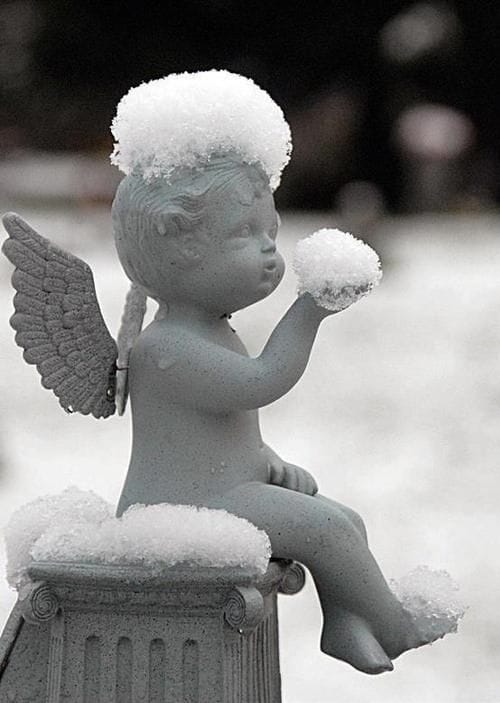
“And then one day
A magic day he passed my way
Though we talked of many things, fools and kings
This he said to me
“The greatest thing you’ll ever learn
Is just to love and be loved in return.”
But I could have told you, Vincent
This world was never meant for
One as beautiful as you”
I have come to terms with the unfairness that death and dying can bring. The bottom line is that life has always been unfair, uneven, and imbalanced. After our loved ones die, we might feel ripped off, like, “Hey, wait a minute, that wasn’t supposed to happen!” And then people will say to us, “They are in a better place; he’s not suffering anymore, his pain is gone, and he will be with you always.”
Without sounding ungrateful, most people’s intentions are kind and well-meaning. But what if they said, “Oh, don’t be silly, they didn’t die,” “I just saw them in the next room,” or “Get over it!” “Have you lost your mind?”
As I get older, I am getting used to people dying. Their demise is sad, and the loss of life is still excruciating. But then the importance of living smacks me in the heart, and I want to live more than ever.
Out of confusion and in a searching mode, after my father passed, I went to a fortune teller. I still hold onto her soothsaying wisdom to this day, just in case it’s true.
A week after my dad left me, I spent many evenings looking up to the starry-starry night and wondering where his soul had gone. Based on a friend’s referral, I made an appointment, drove to Kitsilano and quickly found the address.
Upon entering, the room was still, and I noticed my surroundings: a ticking clock, the slight aroma of musk incense, combined with the telltale signs of a cat. That distraction reminded me how much I love cats. And I may be better off getting advice from a feline friend grooming itself and purring out a morse code mantra than a stranger in a trance perseverating over my existence.
While waiting for my anticipated forecast, upon her instructions, I breathed in the positive and breathed out the negative.
Eventually, snapping out of her trans-like state, the clairvoyant said, “You will live a very long life and become wise beyond your years. People of all ages will come to you seeking wisdom.” After hearing this, a sense of relief washed over me, and I was flattered, paid my fifty dollars, and went on my way. But, hanging onto an airy-fairy prediction that I have never forgotten makes me wonder, am I willing the prophecy to be true? Do I dare question its origin?
If my dad were still alive, I know he would hate the modern-day fashion of ripped jeans. To him, it would be a sign of poverty. He might say, “Why on earth do those people not mend their pants?” Or “Will you look at that poor bugger, too poor to buy new clothing. Maybe we have something laying around the house we can give them?”
He would shake his head at present-day technology and say, “For darned sakes, will you look at that!” When I showed him my cell phone, he’d comment, “Well, I’ll be damned!” A computer would be almost unfathomable. However, I presume he would love looking things up on Google.
Or maybe he would throw his hands up and growl, “Whatever happened to socializing, telling jokes, and a good old-fashioned game of charades.”
I’m glad I had a good dad, even though he had a tough upbringing and was not given any tools for being a husband or a father. He somehow had a love-thy-neighbour attitude and decided at a young age to always be kind, especially to children. Yes, I suppose he made mistakes. I know I certainly have. Regardless, I still miss him.
What about you?
Do you have questions you would ask your parents or another loved one, if they were still here? As I ask you this, I wonder if it stirs up feelings of joy, annoyance, anger, or pain. Do you laugh out loud or quickly bury the thoughts and feelings in the back corners of your mind?
I would love to hear from you in the comments. It can be cathartic to share, and I am interested.
When my son, Mackenzie Vincent Harmon, suggested I write a blog, he also said this…
“And then your blog can have a positive tie-in at the end, like how you can still have these conversations in your head, and see your dad so vividly, that he clearly did enough to impact your life with the bit of time he had.”
-Mac
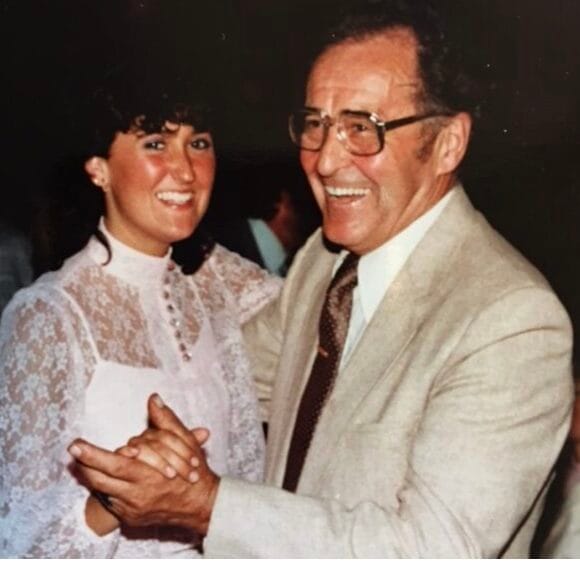
Karen age 22 and Vince age 67
Thank you.
Don Mclean
Born October 2, 1945, is an American singer-songwriter and guitarist. His most acclaimed songs are American Pie, Vincent, Castles in the Air, and I love You So.
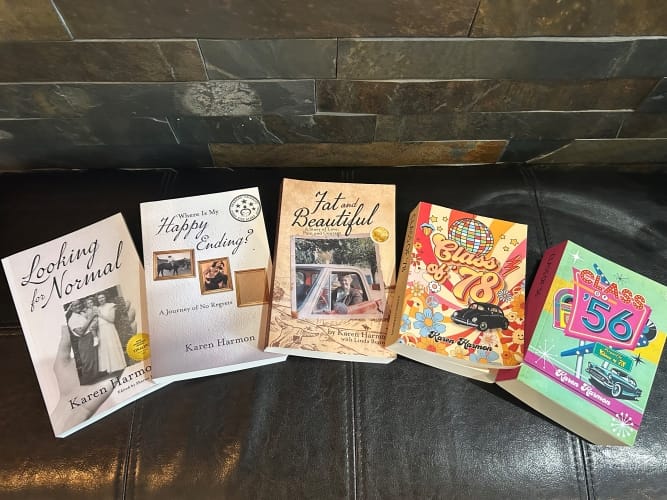
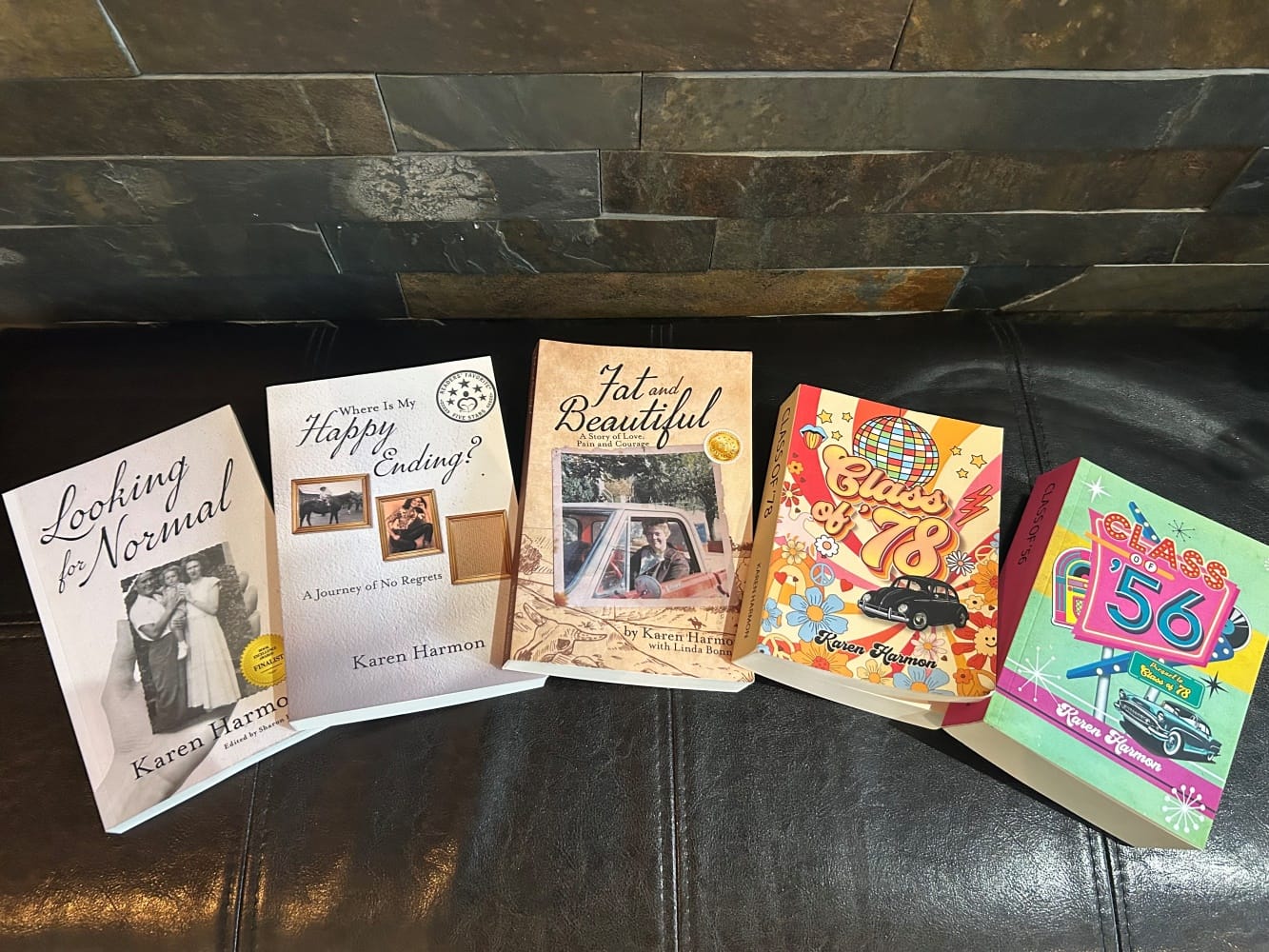
Karen, thank you for a wonderful read. I so enjoy your writing style. I could hear Don McLean singing as I read the words to the song, and drifted back to a memory from 2021 when I went to the Van Gogh exhibit in Vancouver. You certainly have a way of pulling the reader back and enjoying your family’s story, although it was a sad time. I lost my Mom in 2019, and my dad in 1997. I found it interesting that you went to a fortune teller, as this year I spoke with someone who connected with my parents and through her I was able to express some feelings and answer some questions I had. It was truly a moving experience. I love the picture of you in the pretty dress with a haircut that I also had around that time! Continue sharing your stories.
Thank you so much, Cindy. It’s such a beautiful song, and it made me think of how usually joyous I am, but I have this other side where I like to recall memories and treasure the more bittersweet times from my past. I think we have that in common, you and I. My sister recently sent me that photo; I had never seen it before. But then I remembered wearing the dress to a birthday party and how I loved it; I was so proud. I also want to thank you for your kind support; I appreciate it very much. xoxoxo
Linda Bonner
What an amazing memory of our dad. I shed a few tears and am so blessed to have such an amazing sister that can put all those wonderful memories together. All my luv
I am so blessed to have a supportive, kind and always encouraging sister! Thank you so much for everything! I have enjoyed getting to know you through writing our book together. All my luv xo